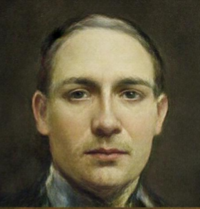Suryopranoto: Difference between revisions
mNo edit summary |
mNo edit summary |
||
| Line 122: | Line 122: | ||
He took over his father's company after his death in 1948. His popular policies while serving as director of the company garnered him political support, and was subsequently elected to the parliament in 1966. | He took over his father's company after his death in 1948. His popular policies while serving as director of the company garnered him political support, and was subsequently elected to the parliament in 1966. | ||
==Political career== | |||
tba | |||
==Personal life and later life== | ==Personal life and later life== | ||
Revision as of 08:42, 13 October 2023
Suryopranoto | |
|---|---|
| Célestin Émannuel Rousseau | |
 Portrait of Suryopranoto, 1972 | |
| 23th Prime Minister | |
| In office 31 May 1972 – 16 June 1976 | |
| Monarch | Purnawarman V |
| Preceded by | Saipudin |
| Succeeded by | Satrio Harjosupadmo |
| Constituency | Sragen III |
| Personal details | |
| Born | March 26, 1913 Sambong, Sragen, Kertosono |
| Died | September 6, 1977 (aged 64) Madhiun, Kertosono |
| Political party | SIK |
| Spouse | Sarinem |
| Children | 4 |
| Alma mater | University of Ngawi |
Suryopranoto (Kertic: ꦯꦸꦂꦪꦥꦿꦤꦠ Suryåpranåtå, Lysian: Célestin Émannuel Rousseau) was a Kertic politician, economist businessman who served as the 23rd Prime Minister of Kertosono from 31 May 1972 until 16 June 1976 from the Kertic People's Party (PKK). To this day, he still is the only high-ranking official not to possess any Kertic heritage or background.
Born to Florentian immigrants in Sragen, Suryopranoto obtained a degree in economics at the University of Ngawi and worked at the Bureau of Civil Planning at the Ministry of Home Affairs from 1937 to 1948. After his father's death in 1948, he took over the family business and became its director. During his tenure as director, he implemented several progressive labor policies, which garnered him poltiical support from his associates. He became a member of parliament in 1966 representing the Sragen III constituency from the Kertic People's Party (PKK). He became a strong anti-thesis to the governing body, objecting neoliberal and laissez-faire capitalist ideas ushered by the majority coalition. He was elected minority leader of the parliament after the 1970 general elections which saw the PKK's share of the parliament nearly double. Following an espionage scandal involving the sabotage of key PKK buildings and sites orchestrated by the United Kertosono Party, Prime Minister Saipudin stepped down and held fresh general elections in 1972. Suryopranoto was sworn as the nation's 23rd prime minister after managing to form a coalition with several smaller parties such as the Kertosono Salamid Union, and the Revival of the Ulama.
Early life
Suryopranoto was born in 1913 to Louis Martin Rousseau (1879-1948) and Marie Éloïse Rousseau (1883-1964) in the town of Sambong, Sragen. His parents emigrated from Florentia in 1905 to Kertosono, escaping political and economic instability. His father was a shopkeeper and merchant who managed to open his first shop in 1910. In 1911, the entire family converted to Salamid, and gained Kertic names. The couple and their two eldest children recieved Kertic citizenship the year after. Suryopranoto attended the local elementary and middle school before moving to Wringinanom to continue his high school. He continued his education in the University of Ngawi, pursuing an economics degree. There, he was exposed to the PKK's youth wing, and became involved in its activities. He graduated in 1937 and became a civil servant at the Bureau of Civil Planning under the helm of the Ministry of Home Affairs between 1937 and 1948.
He took over his father's company after his death in 1948. His popular policies while serving as director of the company garnered him political support, and was subsequently elected to the parliament in 1966.
Political career
tba
Personal life and later life
Owing to his Florentian heritage, Suryopranoto speaks Florentian Creole in addition to Kertic. He was raised both in a Kertic and Florentian setting. In 1936, he married Sarinem, the daughter of one of his father's associates. Together, they had three sons and one daughter.
Death
Suryopranoto stepped down as party leader in 1976 due to his "frail" condition. His condition deteriorated rapidly, and was bed bound by mid 1977. He died on the 6th of September 1977 in the Emperor Adityawarman II General Hospital in Banyumas. Tens of thousands of people attended his funeral held the next day. Countless more watched the telvized broadcast of the funeral.
While reports published during the time of his death did not report on his cause of death or illness, later reports and leaks confirmed that the ex-PM died of a stroke, paralyzing his body.